When you read the words “Ramona Quimby,” what do you think of? For me, it’s a rapid-fire slideshow: Ramona squeezing out all the toothpaste in the sink. Ramona with a plate of peas dumped on her head. The fact that her doll was named Chevrolet.
Books have always been like this to me; even when I don’t remember the whole plot, I remember something. I remember the traumatizing fire in Elizabeth A. Lynn’s The Sardonyx Net; Achren’s castle from Lloyd Alexander’s Prydain; the way it felt the first time I read a Kelly Link story; the trees from Midnight Robber. I remember entire scenes from The Lord of the Rings, but then, I read it at least four times as a teen.
The last couple of years worth of reading, though? I barely remember anything. To say it’s disconcerting is to understate it considerably. Did we read books? Are we sure?
Ages ago, I watched the movie Das Boot with someone who had an extensive knowledge of history. He filled me in on things; he went on tangents, fascinating details I no longer remember because my brain refuses to hold on to historical facts. Like the name of any wine I’ve ever enjoyed, they simply slip in and slip back out again, as if my mental tide reverses itself somehow.
“How do you know all this?” I asked him.
“I don’t know,” he said. “How do you remember the plot of every book you’ve ever read?”
I couldn’t answer, because remembering what I read was something I just did. If you are a book-rememberer, you know this feeling. You know that it’s not exactly useful to remember why Iceland is the place to be at the end of David Mitchell’s The Bone Clocks, but that memory is still in there, practically locked away in a vault. A certain reveal in Maggie Stiefvater’s The Raven Boys? Positively etched into my mind. Long stretches from Sabaa Tahir’s An Ember in the Ashes. The cold beach at the start of The Bone Witch. You get the picture.
But pandemic brain fog is real. Stress messes with our brains. When everything is the same, day in and day out, well, that doesn’t help either. As Harvard professor Daniel Schacter put it to the Washington Post, “Distinctiveness improves memory.” In 2020, especially, little felt distinct. There was a Zoom. Another Zoom. Maybe a walk outside, switching sides of the street when someone passed, because there was so much we didn’t know yet. My partner and I took long walks in the hills, ogling expensive houses and catching glimpses of Mt. Hood and Mt. St. Helens in the distance. But even the trees and the park and the mountains began to blur: A fir tree. A mountain. A sunlit day. (If you’ve had covid, the memory muddle might be even worse.)
Remembering what we read is hardly the most vital thing to remember from these—or any—times. But that doesn’t make the vagueness less disconcerting. I wonder, a little bit, if this is part of why some people have struggled to read at all: if your brain isn’t making the usual memories, even little ones to keep you on the narrative’s path, how do you find joy in a story? Is it just little scenes, strung together by the faintest of recollections?
And, cruelly, the way that some of us throw ourselves into books—gulping down whole tomes in one go—probably isn’t helping, either. That sustained read can be the greatest escape; spending a day blazing through Leviathan Falls is, on the surface, a delightful memory. But two months later, when a friend finished the book and messaged me about it, they referenced parts of it that I could barely contextualize. A study in 2017 found that people who marathoned TV shows retained fewer details than those who watched them week by week. As for books, the same article explains, when you read them all at once, you only keep it in your brain while you’re reading; it’s the need to re-access it that helps you remember it longer.
But, my brain whines, I just want to smother myself in stories as a distraction/treat/escape/way to imagine a different world! Tough titties, brain! We’re going to have to spread things out a little more.
Buy the Book
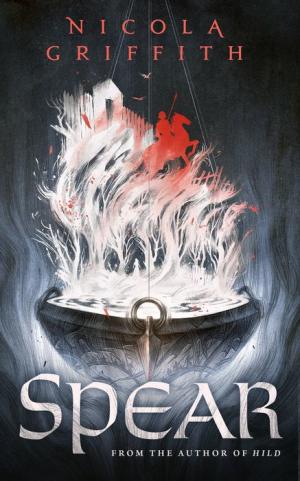

Spear
“This may be a minor existential drama—and it might simply be resolved with practical application and a renewed sense of studiousness,” Ian Crouch wrote in The New Yorker, in a 2013 piece called “The Curse of Reading and Forgetting.” The problem clearly predates the pandemic, though it might feel particularly acute now. Studiousness? Can we muster up the clarity of mind for true studiousness?
Crouch also says,
How much of reading, then, is just a kind of narcissism—a marker of who you were and what you were thinking when you encountered a text? Perhaps thinking of that book later, a trace of whatever admixture moved you while reading it will spark out of the brain’s dark places.
I don’t know that I can agree that that’s narcissism, not exactly; isn’t that the story of who we are? We are the sum of the people we used to be, including what they were thinking—and reading. We learn when we read, and one of the things we learn is about ourselves: how we react, emotionally or intellectually; what we retain and let go of, where we want to return, where our gaps in knowledge are and what compels us in a story. A book reflects what you bring to it and you reflect what you take away from it. You can’t be who you are without being who you’ve been, and your reading life is part of that.
There are many recommendations for improving one’s memory all over the internet; the experts do what the experts do, telling us to sleep better, eat better, exercise more, go for a walk, look at nature. Touch some grass. Where books are concerned, I tend to think a little more literally: writing down even a few thoughts about each one I read sometimes locks it into my mind a little more, even if it’s just a tweet screaming about how much I loved it. (Writing by hand is supposedly even better for remembering things. Presumably even if you can no longer read your own chicken scratch.)
What did you read last year? What do you remember? What will the things we do—and don’t—remember reading over these years tell us about who we are and what we did?
Last week, for the first time in years, I took a book to a bar. On the patio, on an unseasonably warm day, I laid Matt Bell’s Appleseed open on a picnic table and took a sip of an extremely good drink. Across the way, under the other heater, was another reader.
I’ll remember that one.
Molly Templeton lives and writes in Oregon, and spends as much time as possible in the woods. Sometimes she talks about books on Twitter.










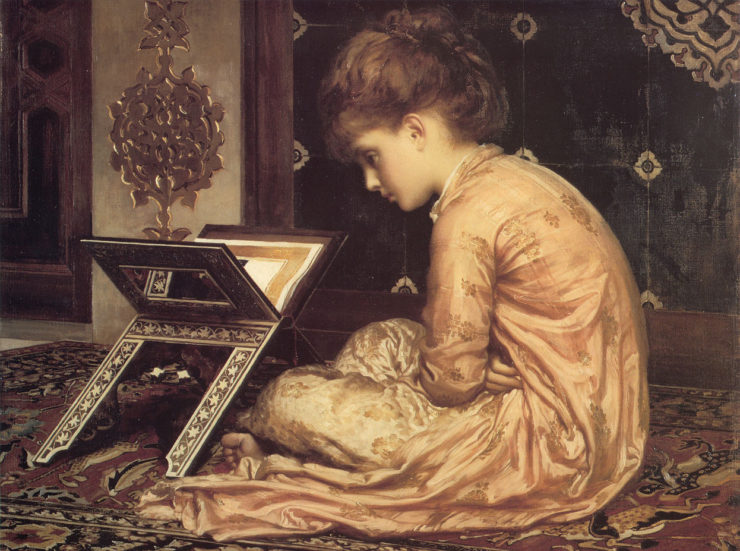
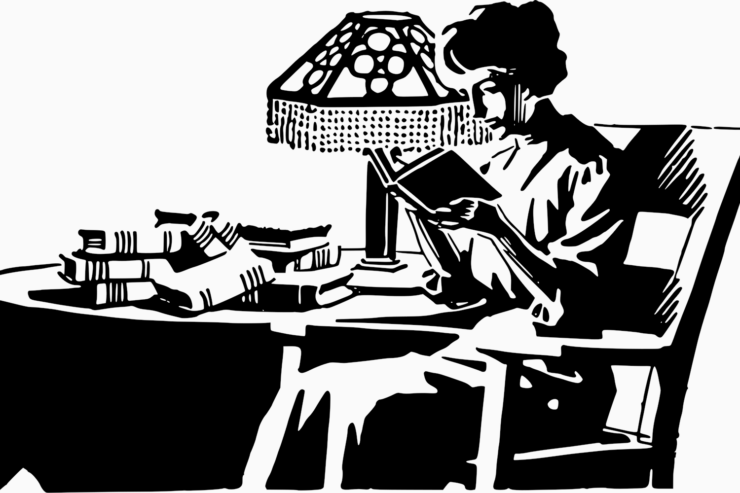
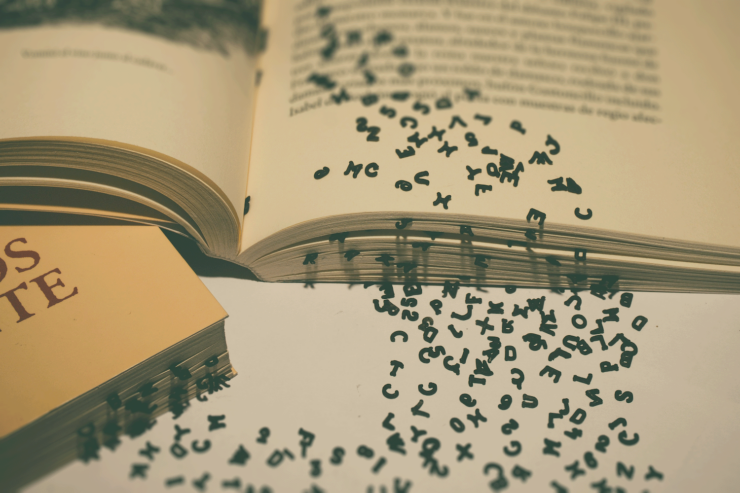
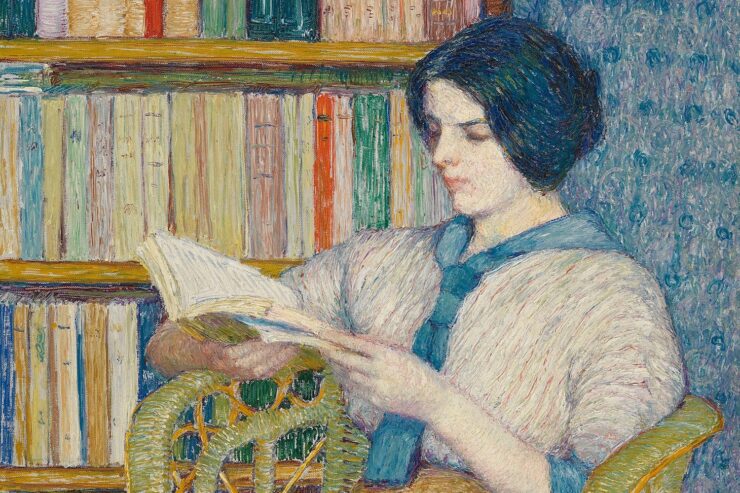
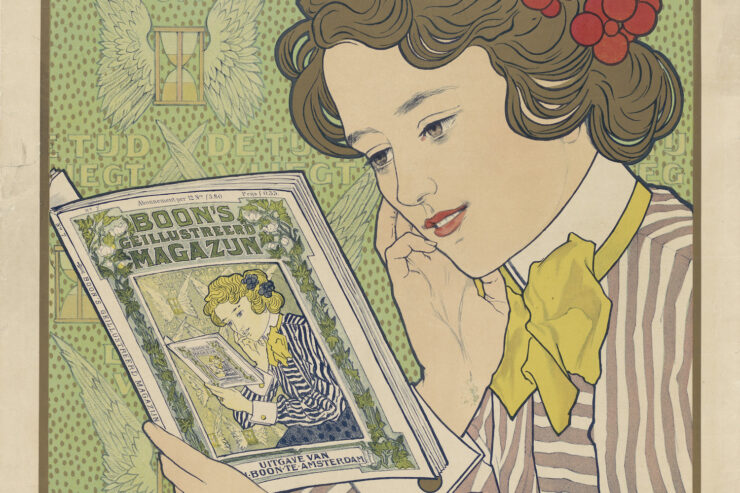
As an English major, I trained my brain to remember books, and I can recall novels I read in graduate school in decent detail fifty years later. Recent books, I barely remember, and it’s not senior or Covid brain, either. Very few books are worth remembering, or they are so dang similar that I can start a book and think to myself, “I’ve read this already,” and I haven’t. I now write short reviews to help me recall books and to share with a reading group I belong to.
I’ve always been very good at remembering what I’ve read. What I’ve lived through not so much
One benefit of forgetting books is that you can be surprised by them again. Re-reading is a great pleasure, and if you liked the book once, you’ll likely like it again. Of course, you have to remember that it’s one you liked… I admit I use Goodreads for that.
I’ve been experiencing this recently. For example, out of the blue, my husband mentioned a movie he was watching was based on a book by Steve Martin. “Shopgirl” I responded–absolutely shocking him. I read it about 20 years ago and hadn’t thought about it since. But as I started watching, the details came flowing back–and it was a very good movie. It was a lovely book, but I’ve no intention of rereading.
Books have always such for me. I remember, and so I rarely reread, even if the author’s prose might include some wonderful insight I had forgotten. Why would I want to risk being disappointed by reading Gone With the Wind, which totally enchanted me when I was 15? When I pick up a previously read book, I might not remember title or author, but with the first page, most of it comes back–and I go on to something else. Many of the books I’ve read recently haven’t stuck– just words with no characters to grab my sympathy, no dialog to make me chuckle or ponder, no plots to set my imagination on fire and settings that lack detail to bring them to life. Much of today’s fiction is simply characters moving through the motions of life, presenting of problems instead solving problems and striving to rise above them. I don’t want to read about victims–I want to read about folks who refuse to be victims.
I’ve always had difficulty remembering a lot of details in books. I still don’t understand why authors (or their publishers) don’t routinely include a summary of the previous book when publishing sequels or series. I mean, TV shows that come on once a week include “previously on” segments…why on Earth don’t we get this for books published sometimes years apart?
@5. Lots of authors do by giving brief bits of backstory as the story moves along.
Starting a Goodreads account some two and a half years ago caused me to reflect on how well I remember books. Some books from my childhood and teens I recall vividly, I suspect because I read them over and over. Some examples from sf would include Tolkien, Moorcock, Leiber, Howard. Others I evoke such hazy memories as to make me question whether i actually ever even read them. More recent books are the same. Some nail themselves to my brain, others seem to flit away, like dreams, almost from the moment I turn the last page. It’s not strictly about how much I liked the book, either. Sometimes I clearly remember enjoying a book, but don’t remember it well enough to confidently write an in-depth review of it. I have to re-read it first, at least in part. In recent years I’ve gotten better about taking notes or marking the most noteworthy passages with postits to assist my feeble memory. I blame my advanced age, combined perhaps with how the internet is screwing with all of our brains (see: The Shallows, by Nicholas Carr).
Prior to the pandemic, I would read 30-50ish books a year, including a bunch of rereads. I considered myself very good at remembering authors and plots and characters.
Once the pandemic hit, I went through several months where I could hardly read anything at all. I then decided to start reading HEA (happy ever after books) AKA romances so in a partial 2020, 150+ books and in 2021, over 500 books. So far this year, 66. Yeah, I can’t remember any details or names from most of them. This year, I’ve started rereading the ones I loved so I can try to cement more details into my head. I’m still having trouble remembering many character names and plot details but they feel more ‘solid’ in my memories.
On remembering books (versus music or history or…), I think it’s what your brain decides is important. Like @2 princessroxana stated, I remember (certain) books and characters a lot more clearly than life details. My dad loved to travel in the US, visiting the same locations multiple times. He could tell you multiple details about each trip like where he stayed, what he saw, interesting happenings. I never remember that stuff.
I often mis-remember books. I don’t re-read books all that often and when I do I’m always surprised by how I sometimes twisted the story and sometimes had thought some bits from a completely different book were part of the story.
What I remember most from high school reading is that I disliked Dickens and his interminably long details. Even today I tire quickly when an author becomes too descriptive. I suppose I like my imagination to have more freedom in how I visualize the story.
One of the reasons I started keeping a record of book reviews is that I kept resenting that I couldn’t remember as much as I wanted about what I thought about the books I’d read. Though the key distinction for me over the last 20+ years has been whether I’ve liked the book enough that I want it in my permanent collection to be reread later, which divides things neatly down the middle and ensures that the ones I reread are generally the ones I want to reread.
I joke that I only need to own enough books to last ten years. Because ten years is about how long it takes me to forget everything, and make rereading like a new experience. It’s a joke, of course. I still buy books at a blistering pace, about 5 times faster than I can read them.
I am so glad I stumbled across this article. Thank you Molly Templeton for reading my mind. You captured my experience with reading and many of the books I’ve read, that I remember. Memory for me has always been a jig-saw puzzle. Moments of my life are ever present in my thoughts and can be recalled in an instant others gone in an instant. “I have forgotten more than I ever knew.” is one of my most favorite sayings yet I do not remember where I read it, or if I wrote it myself? Such is life.
Last summer I was browsing a used bookstore and came upon a rare copy of Coin Locker Babies by Ryu Murakami. This book had been on my “to read” list for a long time and I decided to buy it. Started reading it that night and had the feeling that it was very familiar–as if I’d actually read it before. But that couldn’t be possible. Surely I’d recall reading such an odd book. I got through a few more pages and the sensation of déjà vu only intensified. I finally had to accept the fact that, somehow, I’d read this book and forgotten it entirely. I was used to forgetting the details of books, but this was a new experience. When had I actually read it? I didn’t recall ever owning a copy. I checked my Goodreads list, where I usually rate books after I finish them, and it wasn’t listed there. Finally, I searched the archives of my public library account and saw that I’d borrowed Coin Locker Babies in 2017 (I must have forgotten to rate it on Goodreads). That was only five years ago. Surely not long enough for a book to so completely escape my memory that I’d see it and buy it, thinking it was new to me. The irony is that Coin Locker Babies is a good book, and it left a good enough impression on me that seeing it in the store made me think: “I should read that.” Looking over my Goodreads list I see many titles (and many that I rated highly) that I have only vague recollections of, but at least I remember that I actually read them.
At least Coin Locker Babies was truly worth a re-read. Most books are not. And as I grow older, my failing memory informs how I approach reading as a hobby. I used to be the type of person who took some pride in having read a certain number of books per year. I sometimes found myself rushing to finish one book so I could hurry and start another. Now that I likely have more years behind me than ahead of me, I consciously prioritize quality over quantity. I probably abandon more books than I actually finish these days. If I know within the first fifty or so pages that a book is average and unlikely to be worthy of a re-read–I put it down and never look back. I don’t want to be on my deathbed having to admit to myself that I wasted time reading countless crappy books that I not only couldn’t remember, but weren’t even worth remembering in the first place.
To read a truly remarkable and well-written book, forget much of it, and approach it again on a re-read, allows for a unique sort of pleasure in rediscovery and reevaluation. As I get older I find myself revisiting select titles over and over, allowing adequate time for my memory to get fuzzy enough that when I do pick them up again, the experience of the re-read is that much more rewarding.
I read a Georgette Heyer mystery this month and when I went to add it to my Goodreads list I discovered that I also really enjoyed it the last time I read it, around five years ago! Like most readers I usually at least feel that sense of familiarity after the first few pages of something I’ve read before, but this time there was just… nothing.
I think at least part of the problem in remembering what I read over the last couple of years is related to why books read as teens or young adults seem to have been so much better than books written recently, no matter when the reader was a teen/young adult. Its that by now you’ve seen all the story lines, sounded out all the tropes, been surprised by all the plot twists. It was all new and different once. But eventually you’ve seen so many episodes of Law and Order that you can’t keep track of which ones are which.
Which is, I believe, why we switch preferred genres over time. If you feel like you’ve read every possible permutation of detective/murderer/victim or werewolf/vampire/fairy, then you can switch over to wizards/orcs/swords or spaceships/AI/aliens and start over.
Great essay. I find that, as an older reader, I retain less than I did when I was in my teens, the so-called Golden Age of science fiction. But there are a lot more stories in my brain for the new stuff to compete with. In the past few years, I’ve found myself reading less challenging books. Star Wars books, in particular, have been my comfort reads. I already know the setting, and sometimes the characters, so it is easier to slip right into them.
Maybe a dozen years ago I began writing a list of every book I could remember ever reading. For awhile after I’d think of more and add them. For at least two years I’ve not recalled any that aren’t on my list. If I read them, they must be well and truly forgotten.
I remember less now because I’m less invested and more critical about my reading. Less “that was an amazing scene” and more “that was well written.”
One solution to force breaks in your reading is to have several on the go and be switching between them, giving you time to reflect on each before returning to it.
I really needed to read this article, because I used to have such a good memory, and now it’s completely effed. I’ve been reading a lot the past few weeks, and 2020 was my ‘most read ever’ year, but I just binge things and it feels like it’s more difficult to remember them every day. Even things I really like.
I think a nice way to handle it is just to tell my partner about the books I am reading, because we end up talking about some idea or other and it kinda sticks with me more like that. Writing some stuff down is also a good idea.
I almost never remember character names, but I have a vivid imagination, so there’s usually at least one scene (more likely, several) that I can remember in vivid detail. But if someone mentions a particular character, I will probably have no idea who they are talking about.
I’m not the only one! Books stay with me as impressions, moods, moments and particularly memorable characters. My spouse remembers every plot detail of his reading to my amazement. I was recently looking at Good Reads and it showed me a review I had written for a book I didn’t remember reading. I thought there was a mistake, then read the summary and the whole book dropped back into place. That one was early in the pandemic when I was terrified and living in (under?) books. Keeping track definitely helps me remember.
I’ve read so many sci-fiction stories that I can’t remember the ending to. I even have an interesting scene of a space colony in my mind but don’t know which book it belongs to.
I don’t see this as a reason to put off reading, though (although it is disconcerting). I’m happy to know that the really great story endings stick in my mind, and I revel over them in recall.
I reread books I like. It usually takes me about 4 readings to get the plot down thoroughly. lt makes readings 2 through 4 more enjoyable than they might be. Over the years it’s saved me money and trips to the library.
I write reviews for EVERY book I read and post them on LibraryThing. It helps me to remember what I just read. The only stories I recall details from are those I’ve re-read and re-read.
I’ve kept a spreadsheet of books read since 2003 (2011’s file is only halfway through the year, but I had Fun Medical Problems that year, kept busy). That reminds me, have one more book to add to February. I always have a thumbnail review to jog my memory.
It me. I remember loving being able to connect details in a long series (Pliocene Exile!) in my teen years back in the eighties, but damn if I can remember who did what moving on to each book in the Stormlight Archive (the Expanse was easier tho) – Thank goodness for the internet providing me with synopses. I’ve noted down most of the books I’ve read since the eighties and used to write reviews, but fell out of the habit.
Many years ago (back in the 90s), I took someone’s idea and created a text file on my hard drive called BOOKS95. Every time I finished a book, I added a line to keep track of the number of books I read along with titles and authors. Come January, I started BOOKS96. A few years later, I looked back and couldn’t recall details about many of these books, so I go a miniature notebook, and I jotted down a few notes about the book. Not so much a review, but maybe somethng about the main character, the plot or the setting.
These days, I have a reading blog that serves the same purpose. I can update it or access it from anywhere. It has a four year gap in it where life took turns and I gave up on it for a while. But I can search on a book, an author or a character name.
And I occasionally find books that I have no memory of at all. But the descriptions tend to ring some bells.
Thank you so much for this. It has been a source of grief and dismay that i have been unable to read for the past 2 years. I start a book and after a few pages feel tired and empty. I’ve been bingeing tv to fill the long hours (no commute), but remember little of even the quality shows. This line healed my heart a little: “I wonder, a little bit, if this is part of why some people have struggled to read at all: if your brain isn’t making the usual memories, even little ones to keep you on the narrative’s path, how do you find joy in a story? “
I tend to lose track of a book’s plot while still reading it and not care, but usually ditch any book if the settings and characters are insufficiently vivid to immediately stick in the mind. Sometimes I can figure out the timing of past events in my life by recalling which book(s) I was reading at the time, sometimes vice versa. As a kid, I reread books so much that I can still rememember some of those books verbatim. Now I reread books mostly when I’m following a blog of podcast covering them (e.g. several on Tor) and want to discuss them there with expertise, or when they become comfort reads (e.g. Discworld). Since I switched from print books to audiobooks 10+ years ago — much more usable for my weak eyes and chronically pained hands — I listen to them (or podcasts discussing them) in all of my waking hours not spent underwater or talking with people, so I’ve been consuming them faster than ever.
I was thinking about this just the last few days. I’m reading The Night Country and I found I could barely remember The Hazel Wood. And I didn’t read it that long ago! I can remember enjoying it and the vague idea (girl goes into fairytale world), but that was about it. I really needed a previously on at the start of the book.